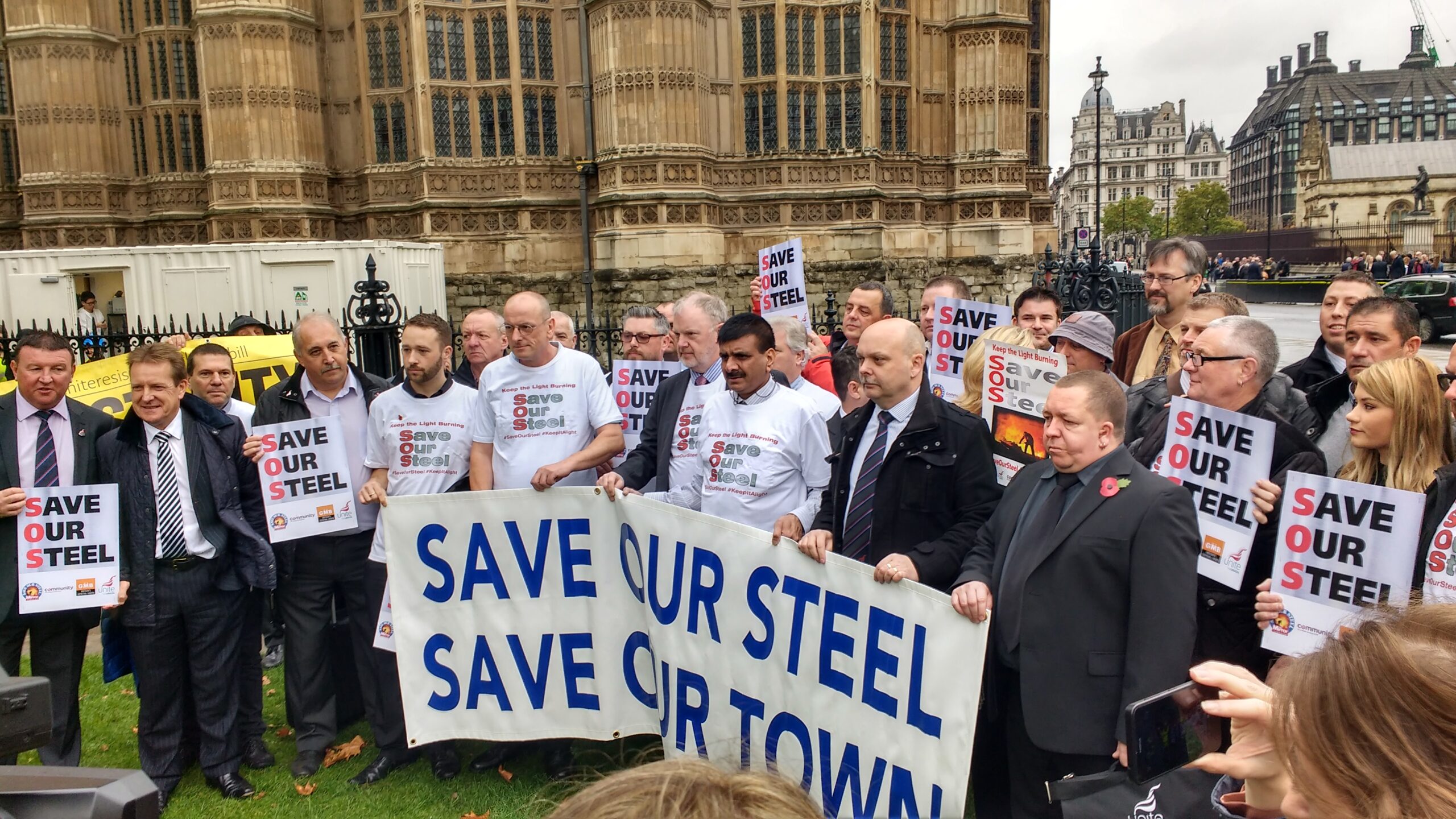The socialist case for nationalisation of the steel industry
Alistair Tice
Whoops and cheers greeted Jeremy Corbyn’s visit to Scunthorpe on Thursday 29th October, to show solidarity with the town’s steelworkers who are facing 900 job losses at the Tata-owned steel plant.
On his visit, but in little publicised remarks, Jeremy suggested that the Scunthorpe plant and/or the steel industry should be nationalised.
Speaking to the Scunthorpe Telegraph, he said: “We’re talking about state intervention and supporting the industry through public ownership or support for existing ownership.”
And the BBC quoted Jeremy as saying that the intervention could include a “joint enterprise with the company concerned or taking it into ownership”.
This is a welcome change from previous remarks by Labour spokespeople, which have been inconsistent and more ambivalent on the question of nationalisation.
The call for nationalisation should now form a central part of Labour’s policy and demands, for the steel industry and in other cases where job losses are threatened.
The trade union leaders involved must also press for nationalisation, which is the only solution for the workers facing the job losses and for their communities.
Socialist Party members campaigning in Scunthorpe to save the steel jobs have received an overwhelmingly supportive response to our petition calling for nationalisation of the steel industry.
Common reactions include “They bailed out the bankers so why not steelworkers?” and “It should never have been privatised (by Thatcher in 1988) in the first place” and “Not just steel; the railways, energy, the utilities, they should all be re-nationalised.”
Effect on workers and the economy
Jeremy Corbyn should shout the socialist case for nationalisation from the rooftops.

Steel march poster, November 2015
Here’s a national emergency with tens of thousands of jobs at stake. Redcar 2,200, Scunthorpe 900, Scotland 270, West Midlands 300, and South Wales. And for every steel job, it’s estimated that another five or six jobs are lost in the supply chain and in the local economy. That’s at least 30,000 jobs!
It would actually be cheaper for the government to pay limited compensation (not to the fat-cat multinational owners, but on the basis of proven need) and subsidise the industry for a period, than the costs of paying for 30,000 redundancy packages and dole payments and the loss of workers’ taxes, not to mention the depression of local economies.
Not just that, if steel was nationalised then the government could use its procurement powers to secure contracts to supply the steel at guaranteed prices for infrastructure and construction projects.
Rail track, housing, hospitals and schools all need steel. A massive new windfarm is being built in the nearby Humber estuary that needs steel for the masts and blades. So not only would steel jobs be saved, but new jobs created as part of a mass programme of public works.
And if nationalisation of the steel industry breaks EU rules, then what better issue from which to make the socialist case for leaving the capitalist EU in the interests of working class people.
As Jeremy Corbyn correctly said: “If we allow our steel industry to go we will then be forever at the mercy of world markets.”
Ruthless free market
Tata, an Indian owned multinational company, likes to pride itself for its Corporate Social Responsibility and philanthropic trusts, but under the laws of the free markets, ie global capitalism, it becomes as ruthless as the next multinational in cutting costs and moving production to maintain and boost profits.
Indeed, Tata’s European steel operations turned a £110 million profit last year. And where have all its profits gone that it has taken out of Scunthorpe over the last ten years?
The Tory government’s response to the steel crisis has been feeble. Together with Tata, it is putting up £9 million to help redundant steelworkers to retrain and apply for jobs. “Re-train for what? To work in McDonalds on a zero hours contract for £6-70 an hour?”
The local steel task force set up by the Tory government is to be headed by North Lincolnshire Tory council leader Liz Redfern, just made a Baroness by Cameron, but better known locally for previously not paying her own business rates for ten years!
900 steelworkers will not be reassured to learn from her that “the council has 10 vacancies for HGV drivers to drive bin lorries and other such vehicles” especially as North Lincs council is cutting employees’ terms and conditions.
That’s why, having already lobbied parliament, the local steel unions: Community, Unite, GMB and SIMA (the managers association), have called for a mass demonstration in Scunthorpe on Tuesday 10th November to march on the North Lincs council meeting to demand “Stand Up For Steel”.
There will also be a demo in Motherwell, Scotland, on Saturday 7th November, at 10:30am at the Dalzell plant, Motherwell, marching at 11am to Ravenscraig
This version of this article was first posted on the Socialist Party website on 1 November 2015 and may vary slightly from the version subsequently printed in The Socialist.









